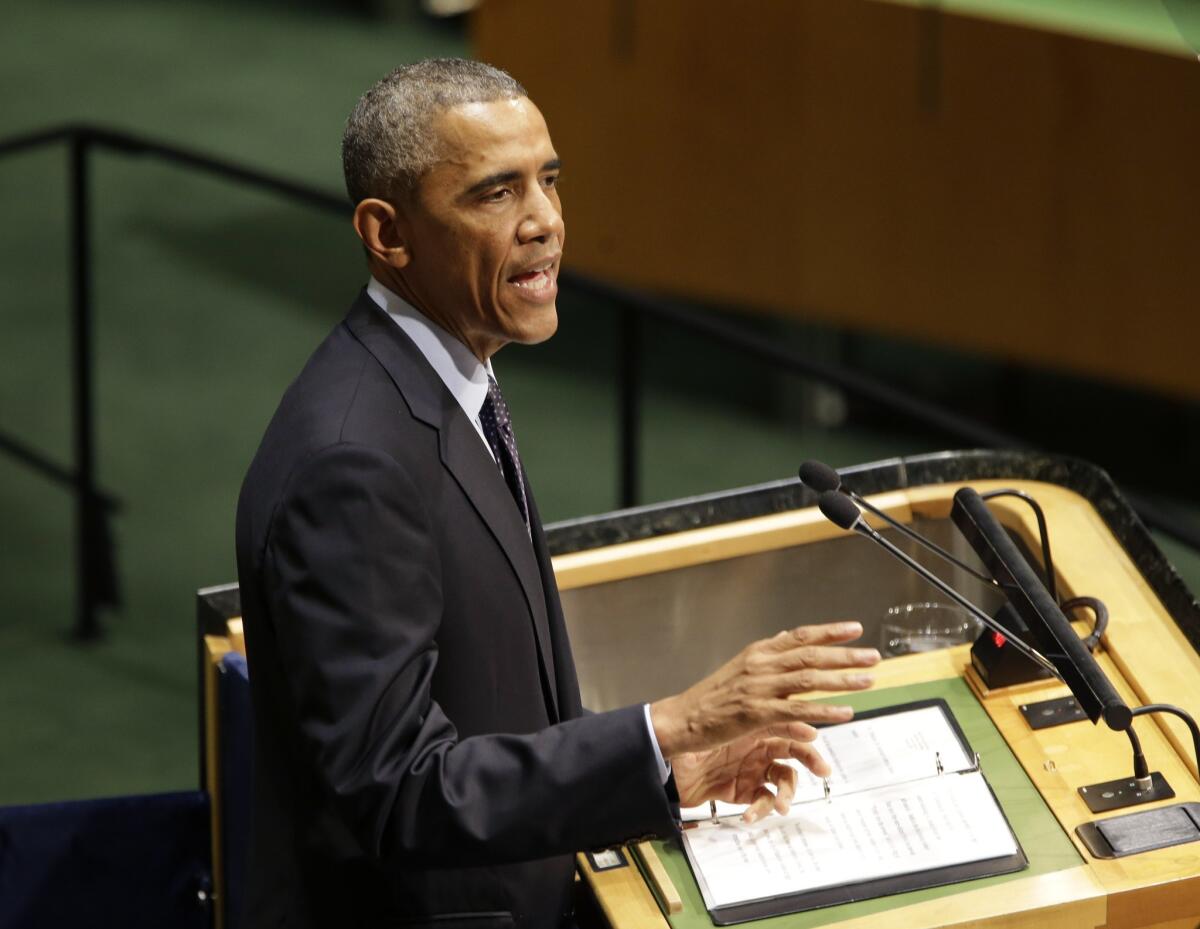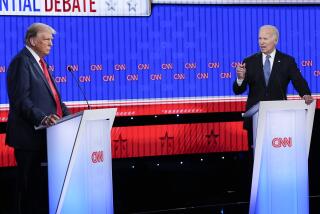Obama calls for more aggressive fight against climate change

- Share via
Reporting from the United Nations — President Obama on Tuesday called on both emerging economies and world powers to take more aggressive steps to slow climate change, saying “nobody gets a pass” on addressing the foremost challenge of the century.
In brief remarks at the U.N. during a summit on climate change, the president acknowledged the many crises facing world leaders, but argued none will match the potential damage of small shifts in the temperature already causing extreme drought, hurricanes and wildfires across the globe.
“There’s one issue that will define the contours of this century more than any other,” Obama said. “That is the urgent and growing threat of a changing climate.”
Obama aimed his remarks at both developing nations whose rapid growth has exacerbated the problem and the industrial Western economies, whose growth in the past century created it.
“We recognize our role in creating this problem; we embrace responsibility to help combat it,” Obama said. “Nobody gets a pass.”
But in a speech aimed at inspiring the world to take action, Obama offered no new major initiatives to cut carbon. He instead told of two smaller steps the U.S. would take: a new executive order that requires federal agencies to consider climate resilience in international development work and investments, and an initiative among U.S. agencies to make data used in predicting weather shifts more easily available.
The U.N. climate summit is a launch pad for the work of crafting an international agreement that could reduce emissions enough to mute the predicted painful blows of climate change. Negotiators aim to adopt an agreement in Paris next year.
The president spoke amid a backdrop of an all-time high for global emissions of heat-trapping greenhouse gas. On Sunday, scientists announced that the world’s emissions had grown 2.3% last year to 39.8 billion tons — their highest level ever — largely because of China, the U.S. and India.
Over the last few weeks, independent analysts and advocates for action on climate change have focused on the economic risks of global warming — and the rewards of timely action. The cost to the U.S. economy of doing nothing on climate change will be 2.2% to 5.2% of GDP by 2100, Standard & Poor’s Ratings Services recently estimated.
In addition, key administration officials have warned of the domestic economic consequences of climate change. More damaging storms, flooding and drought would stunt the country’s gross domestic product, said Shaun Donovan, director of the Office of Management and Budget. As a result, his office has begun to review “regulations and standards to ensure that we are appropriately pricing risk over time,” he said.
Treasury Secretary Jack Lew spoke of how disasters amplified by climate change have already started to take a bite from the federal budget, such as the $24 billion the National Flood Insurance Program has borrowed from the Treasury to pay for rebuilding after the last decade of devastating hurricanes.
“If the fiscal burden from climate change continues to rise, it will create budgetary pressures that will force hard trade-offs, larger deficits or higher taxes, and these trade-offs would make it more challenging to invest in growth, meet the needs of an aging population and provide for our national defense,” Lew said Monday in Washington.
There has been at least one promising sign recently. Last week, an international commission led by former Mexican President Felipe Calderon issued a report that refuted the long-held idea that shifting toward a global economy that consumed far less fossil fuel would necessarily be painfully expensive.
Rather, the Global Commission on the Economy and the Climate estimated that using cleaner technology and fuels would add about 5% to the cost of needed infrastructure projects over the next 15 years. Further, as air pollution lessens by switching to cleaner fuels, societies could save money on health care costs, missed work days and premature deaths, the group found.
For more coverage of Washington, follow @khennessey and @neelaeast
More to Read
Sign up for Essential California
The most important California stories and recommendations in your inbox every morning.
You may occasionally receive promotional content from the Los Angeles Times.















